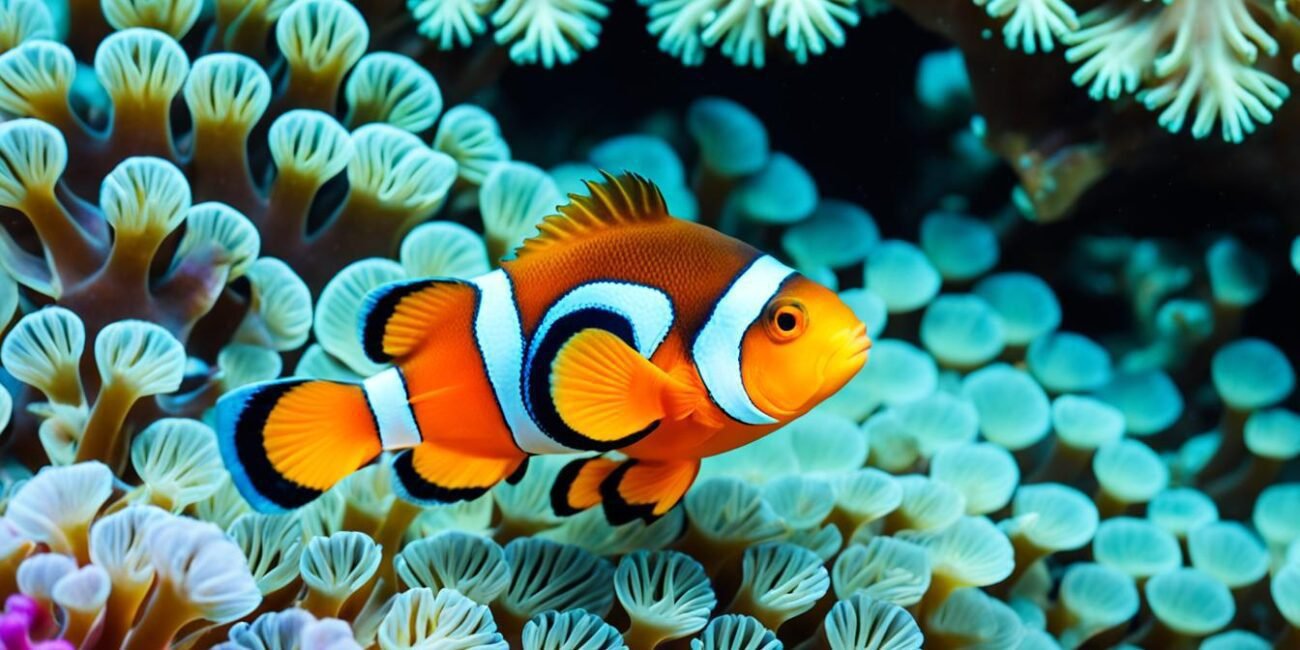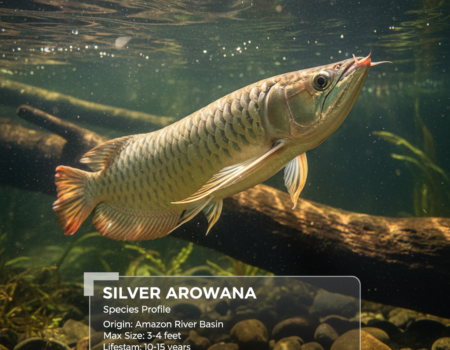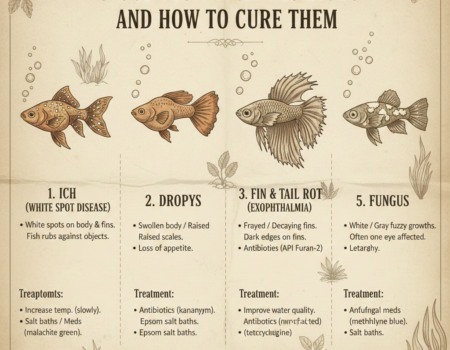Welcome to our fascinating article about the lifespan of clownfish! If you’ve ever wondered how long these vibrant and sociable fish can live, you’re in the right place. We’ll explore the age range of clownfish, from their lifespan in the wild to their longevity in aquariums. So, let’s dive in and uncover the secrets behind these delightful creatures.
What is a Clownfish?
Clownfish, or anemonefish, are fascinating creatures that belong to the subfamily Amphiprioninae. With around 30 recognized species, these fish have captured the imagination of marine enthusiasts around the world. What sets them apart is their unique symbiotic relationship with anemones, which provides both parties with valuable benefits.
In their natural habitat in the Indian Ocean, clownfish can be found seeking shelter among anemones. This symbiotic relationship is formed through an exchange of services: the clownfish receive protection from predators by hiding among the anemone’s stinging tentacles, while the anemone benefits from the nutrients provided by the clownfish’s excrement.
Clownfish are not picky eaters. They primarily feed on small critters they find in and around the anemone, such as plankton and small invertebrates. Additionally, these vibrant fish also supplement their diet with algae, which they graze on from the anemone’s surface. This varied diet ensures their nutritional needs are met.
This remarkable partnership between clownfish and anemones showcases the beauty of symbiosis and highlights the interconnectedness of marine ecosystems. The clownfish’s ability to navigate the anemone’s tentacles unharmed and contribute to its overall health is a testament to the intricate balance of nature.
Through their vibrant colors, intriguing behaviors, and symbiotic relationships, clownfish continue to captivate both scientists and aquarium enthusiasts alike. Let’s explore in detail the factors that influence their lifespan and the steps we can take to ensure their well-being and longevity.
How Long Do Clownfish Live?
The lifespan of clownfish can vary depending on their environment. In the wild, a healthy clownfish can live up to 6 to 10 years. However, in aquariums, their average lifespan is often shorter. This is primarily due to poor husbandry practices, as keeping fish alive requires proper care and knowledge.
While the commonly listed lifespan is 3 to 10 years, many aquarium owners have reported clownfish living for 20-30 years with good care. Captive-raised clownfish tend to live longer than wild-caught ones due to less stress from capture and transport.
Proper husbandry practices are essential for maximizing the lifespan of clownfish in aquariums. Creating a suitable environment that mimics their natural habitat, providing balanced nutrition, maintaining stable water parameters, and ensuring adequate tank size are crucial factors in promoting a longer lifespan for these fascinating creatures.
| Lifespan: | Wild | Aquarium | Captive-raised |
|---|---|---|---|
| Average Lifespan | 6-10 years | 3-10 years | 20-30 years |
| Factors Impacting Lifespan | Environment, predation | Tank conditions, care | Stress from capture, transport |
| Key Factors for Longevity | Natural habitat, nutrition | Water quality, tank size | Reduced stress, selective breeding |
Factors Affecting Clownfish Lifespan.
The lifespan of clownfish can be influenced by a combination of genetic and environmental factors. To ensure a long and healthy life for your clownfish, it is essential to consider several key factors.
Well-Established Saltwater Aquarium
A well-established saltwater aquarium provides a stable and optimal environment for clownfish. Properly cycling the tank and maintaining a consistent water quality can significantly impact their lifespan. It is essential to allow the tank to mature before introducing clownfish, ensuring that the necessary beneficial bacteria develop for biological filtration.
Tank Size and Clownfish Aggression
Tank size plays a significant role in reducing clownfish aggression and territorial behavior. Providing a spacious tank, especially for larger clownfish species, minimizes stress and increases their overall well-being. A tank with a capacity of 125 gallons or more is recommended for multiple clownfish, allowing them to establish their territories comfortably and reducing aggressive interactions.
Suitable Tank Mates
Choosing appropriate tank mates for your clownfish is crucial for their well-being. Aggression and stress caused by incompatible tank mates can significantly impact their lifespan. Research the compatibility and behavior of potential tank mates before introducing them to the aquarium. Avoid aggressive or territorial fish species that may pose a threat to your clownfish.
Stable Water Conditions and Water Parameters
Maintaining stable water conditions is vital for the longevity of clownfish. Regularly monitor and adjust water parameters, including temperature, pH levels (between 8-8.5), salinity, and ammonia, nitrite, and nitrate levels. Fluctuations in these parameters can stress the fish and lead to health problems.
Sufficient Filtration and Tank Cleanliness
An efficient filtration system is necessary to maintain clean and healthy water in the aquarium. Proper mechanical, chemical, and biological filtration helps remove waste, toxins, and excess nutrients. Regular water changes and tank maintenance also contribute to a clean and suitable environment for clownfish.
Table: Ideal Water Parameters for Clownfish
| Water Parameter | Ideal Range |
|---|---|
| Water Temperature | 75-82°F |
| pH Levels | 8-8.5 |
| Salinity (Specific Gravity) | 1.020-1.025 |
| Ammonia (NH3) | Undetectable |
| Nitrite (NO2) | Undetectable |
| Nitrate (NO3) | 0-10 ppm |
Ensuring these factors are carefully considered and maintained will help provide the ideal conditions for your clownfish to thrive and have a long and healthy lifespan.
Care Tips for Clownfish Longevity.
Providing proper care is crucial for the longevity of clownfish. Saltwater aquariums require specific care and regular maintenance to keep them healthy and stable. At our research facility, we have conducted extensive studies on saltwater aquarium care, and we’ve gathered invaluable insights into keeping clownfish thriving. Whether you are an experienced hobbyist or a beginner, these care tips will help ensure the well-being and longevity of your clownfish.
Regular Tank Maintenance
Maintaining a clean and well-maintained tank is essential for the health of your clownfish. Perform regular water changes to eliminate accumulated toxins and deter the growth of harmful bacteria. We recommend performing water changes every two to four weeks, replacing approximately 10-20% of the tank volume. This ensures that trace elements are replenished, and contaminants are diluted, providing a stable and healthy environment for your clownfish.
Compatibility with Tank Mates
When selecting tank mates for your clownfish, compatibility is key. Ensure that the species you select coexist peacefully and do not pose a threat to your clownfish. Some suitable tank mates for clownfish include gobies, damselfish, and wrasses. However, it is essential to research each species’ compatibility thoroughly before introducing them to your tank. This will prevent aggression and stress, which can adversely affect the well-being and lifespan of your clownfish.
Stable Water Parameters
Maintaining stable water parameters is vital for the health and longevity of your clownfish. Aim for a temperature range of 75-82 degrees Fahrenheit and a pH level between 8-8.5. Sudden fluctuations in temperature or pH can cause stress and compromise the immune system of your clownfish. Regularly monitor these parameters using reliable test kits and make necessary adjustments to keep them within the ideal range.
Providing a Spacious Tank
A suitable tank size is essential for ensuring the well-being and freedom of movement for your clownfish. We recommend a tank size of at least 30 gallons to provide ample space for swimming and reduce territorial disputes among clownfish. A larger tank also allows for better water circulation and filtration, enhancing the overall environment for your aquatic pets.
Avoidance of Anemones (Optional)
Contrary to popular belief, anemones are not necessary for the survival of clownfish. While they form a symbiotic relationship with anemones in the wild, clownfish can thrive without them in captivity. Keeping anemones requires specialized care and can be challenging for beginners, so it is entirely optional. Your clownfish can still live a long and healthy life without the presence of anemones in their tank.
| Tank Maintenance Tips for Longevity | Benefits |
|---|---|
| Perform regular water changes | Restores trace elements and dilutes contaminants for a healthy aquatic environment |
| Select compatible tank mates | Reduces stress and aggression, promoting a harmonious tank environment |
| Maintain stable water parameters | Prevents stress-related illnesses and ensures optimal health for clownfish |
| Provide a spacious tank | Allows for unhindered movement and reduces territorial disputes |
| Avoidance of anemones (optional) | Simplifies tank maintenance and removes the need for specialized care |
By following these care tips, you can provide the best possible care for your clownfish, increasing their chances of a long and healthy life. Remember, caring for saltwater aquariums requires research, dedication, and commitment, but the rewards of witnessing your clownfish thrive are truly worth it.
The Secret Behind Clownfish Longevity.
Recent research has unveiled the fascinating secret behind the remarkable longevity of clownfish. Through genome sequencing and comparative analysis with other fish species, significant differences in the proteins of clownfish’s Mitochondria and Lysosomes were discovered. These organelles play crucial roles in energy production and macromolecule degradation within cells, which may contribute to their extended lifespan.
An intriguing aspect of clownfish biology is their unique symbiotic relationship with anemones. This mutualistic partnership provides clownfish with protection from predators, while the fish offer nutrients to the anemones. Additionally, clownfish have evolved a mucus layer that protects them from the stinging tentacles of their host anemones, reducing their mortality rate and providing an advantage for increased longevity.
The discovery of these genetic differences has positioned clownfish as a valuable animal model for studying aging and longevity. Their genetic architecture, particularly in relation to positive selection and protein-coding genes, offers insights into the genetic mechanisms behind extended lifespans. Through further genome analysis and research, scientists can gain a deeper understanding of the factors that contribute to the exceptional longevity of clownfish.
Lifespan Variations in Vertebrates.
Lifespan variations in vertebrates can range from a few months to several centuries. Understanding the genetic architecture that influences lifespan can provide valuable insights into the evolutionary mechanisms that shape life expectancy in different species. From the tiny turquoise killifish with its short lifespan of a few months to the majestic Greenland shark that can live for several centuries, the diversity of lifespans among vertebrates is truly fascinating.
Research on lifespan variations has been made possible by state-of-the-art sequencing methods that allow scientists to analyze the genetic differences among species. These sequencing methods have helped identify the specific genes and proteins involved in the regulation of lifespan and the evolutionary mechanisms that drive these variations.
For example, studies have revealed that the turquoise killifish’s short lifespan is influenced by genetic factors that accelerate the aging process. On the other hand, the Greenland shark possesses unique adaptations that contribute to its extraordinary longevity, such as a slow metabolic rate and the ability to withstand extreme cold temperatures.
To illustrate the lifespan variations in vertebrates, here’s a comparison between the turquoise killifish and the Greenland shark:
| Species | Average Lifespan |
|---|---|
| Turquoise Killifish | A few months |
| Greenland Shark | Several centuries |
As evidenced by these examples, the lifespan of vertebrates is influenced by a combination of genetic and environmental factors. The genetic architecture of each species determines its potential lifespan, while environmental factors can either promote or hinder longevity.
By studying the lifespan variations among vertebrates, scientists gain a deeper understanding of the genetic and evolutionary mechanisms that shape life expectancy. This knowledge has broader implications for research on aging and longevity, as it provides valuable insights into the molecular pathways and biological processes involved in the aging process across different species.
With ongoing advancements in sequencing methods and genetic analysis, we are continuously unraveling the mysteries of lifespan variations in vertebrates. By exploring the intricacies of genetic architecture and evolutionary adaptations, we gain a better understanding of the fundamental mechanisms that determine lifespan, paving the way for future breakthroughs in longevity research.
Clownfish as an Animal Model for Longevity Research.
The ease of keeping and breeding clownfish in aquariums makes them an excellent animal model for research on longevity. Our understanding of aging and longevity can greatly benefit from studying these fascinating creatures. Their unique biological characteristics, such as their symbiotic relationship with anemones and mucus protection, provide valuable insights into the genetic architecture of longevity.
Clownfish are relatively easy to maintain in aquariums, making them a practical choice for longevity research. Researchers can easily observe their behavior, monitor their health, and manipulate their environment to study the effects on their lifespan. In addition, breeding clownfish in captivity is straightforward and can provide controlled populations with specific genetic traits to study.
By studying the genetic variations that contribute to the longevity of clownfish, researchers can uncover valuable information about the aging process in other organisms, including humans. The genetic architecture of clownfish, which allows them to thrive in different environments and exhibit remarkable adaptations, holds promise for unraveling the secrets of longevity.
| Advantages of Clownfish as an Animal Model for Longevity Research |
|---|
| Easy maintenance in aquariums |
| Relatively simple breeding process |
| Unique biological characteristics providing valuable insights |
| Potential to study the impact of genetic variations on longevity |
| Relevance to research on aging and human health |
By utilizing clownfish as an animal model for longevity research, we can gain a deeper understanding of the mechanisms underlying aging and potentially discover interventions to promote longer and healthier lives. Their suitability for research, coupled with their captivating beauty, make clownfish an intriguing subject in the quest for unraveling the mysteries of longevity.
Importance of Tank Size and Reputable Sellers.
The well-being and longevity of clownfish greatly depend on the tank size they are kept in. Providing an adequate tank size is crucial for their overall health and happiness. We recommend a minimum tank size of 33 gallons to ensure sufficient space for clownfish to swim and reduce aggression. This larger tank size allows them to establish their territories without feeling cramped or stressed.
Another important aspect to consider when acquiring clownfish is sourcing them from reputable sellers. Reputable sellers prioritize the health and well-being of their fish, ensuring that they are properly cared for. By purchasing clownfish from reputable sellers, you can be confident that you are getting healthy and vibrant fish that have been raised in suitable environments.
“The adequate tank size is crucial for the well-being and longevity of clownfish.”
These reputable sellers have the knowledge and experience to provide the necessary care for clownfish, resulting in healthier and longer-lived fish. They understand the specific requirements of clownfish and create suitable environments to promote their well-being.
Choosing the right tank size and sourcing from reputable sellers are essential steps in creating a suitable and healthy environment for your clownfish. By providing them with the space they need and ensuring that they come from reputable sources, you set a solid foundation for their thriving and longevity.
The Recommended Tank Size for Clownfish
As mentioned earlier, the recommended tank size for clownfish is a minimum of 33 gallons. This size provides ample swimming space and reduces aggression among the fish. Clownfish are active swimmers, and having a larger tank allows them to exhibit natural behaviors and explore their surroundings.
Having enough space also helps to reduce stress and territorial disputes among clownfish. A larger tank size provides more hiding spots and territories for each clownfish pair, minimizing conflicts and promoting a harmonious environment.
Benefits of Purchasing Clownfish from Reputable Sellers
When you choose to buy clownfish from reputable sellers, you can be confident that the fish have been well-cared for and are in good health. Reputable sellers take pride in providing the best possible care for their fish, ensuring that they are fed a nutritious diet and are kept in optimal conditions.
Sourcing clownfish from reputable sellers also minimizes the chances of introducing diseases or parasites into your aquarium. Reputable sellers prioritize the health of their fish and subject them to thorough quarantine processes to prevent any potential health issues from spreading.
“Choosing the right tank size and sourcing from reputable sellers contribute to creating a suitable and healthy environment for clownfish.”
In addition, reputable sellers often have a wealth of knowledge and experience in caring for clownfish. They can provide valuable advice and guidance on proper husbandry practices, diet, and tank requirements. This support can be invaluable, especially for beginners or those new to the world of clownfish keeping.
By prioritizing the optimal tank size and sourcing clownfish from reputable sellers, you are setting the stage for a successful and thriving aquarium. The well-being and longevity of your clownfish depend on providing them with a suitable environment and healthy start in life.
The Key to Clownfish Longevity.
The key to ensuring the longevity and happiness of clownfish lies in caring for them properly. By creating and maintaining suitable tank conditions, you can provide a healthy and thriving environment for your clownfish, enabling them to live a long and fulfilling life.
Caring for Clownfish
Proper care for clownfish starts with understanding their specific needs and requirements. This includes providing suitable tank conditions, feeding them a balanced diet, and keeping their environment clean and well-maintained.
Tank Conditions
To create the ideal tank conditions for your clownfish, consider the following:
- Ensure stable water parameters, including temperature, salinity, and pH levels, as fluctuations can be stressful for clownfish.
- Invest in an efficient filtration system to help maintain water quality by removing waste and toxins.
- Regularly test and monitor water parameters to ensure they remain within the appropriate range.
- Provide hiding spots and ample swimming space to mimic their natural habitat and reduce stress.
Creating a safe, stable, and clean tank environment is vital for the well-being and longevity of your clownfish.
Appropriate Tank Mates
When choosing tank mates for your clownfish, it’s important to select species that are compatible and non-aggressive. Avoid keeping aggressive or territorial fish with clownfish, as this can lead to stress, injuries, and potentially death. Peaceful species like damselfish, gobies, and tangs can make suitable tank mates for clownfish.
Marine Buddy for Happiness
Clownfish are social creatures and can benefit from having a marine buddy in the tank. Pairing them with other clownfish or compatible species can provide companionship and promote social behavior, contributing to their overall happiness.
“By providing the necessary care and attention, clownfish can live a long and fulfilling life.”
In conclusion, proper care and attention to tank conditions are crucial for maximizing the longevity and happiness of your clownfish. By creating a suitable environment, ensuring stable water parameters, selecting appropriate tank mates, and providing the companionship of a marine buddy, you can create the perfect home for your clownfish and enjoy their beauty for years to come.
Conclusion
In conclusion, clownfish have a diverse lifespan that can range from several years to decades, depending on various factors. To ensure their longevity and well-being, it is crucial to provide proper care and maintain suitable tank conditions. By understanding the genetic variations and unique adaptations of clownfish, we can contribute to research on longevity and aging.
Following the care tips mentioned in this article, such as maintaining stable water parameters, choosing compatible tank mates, and providing a well-established saltwater aquarium, can greatly enhance the lifespan of clownfish. Their genetic architecture and biological characteristics make them an ideal marine research model for studying longevity and aging.
By implementing these care tips and creating a suitable environment, fish enthusiasts can enjoy the beauty and companionship of clownfish for many years to come. With their vibrant colors and engaging behavior, clownfish bring joy and add a captivating presence to any aquarium.
FAQ
What is the lifespan of a clownfish?
In the wild, clownfish can live up to 6 to 10 years, while in aquariums, their average lifespan is often shorter. However, with proper care, some aquarium owners have reported clownfish living for 20-30 years.
What is a clownfish?
Clownfish, also known as anemonefish, belong to the subfamily Amphiprioninae and have a unique symbiotic relationship with anemones. They can be found in the Indian Ocean and primarily feed on small critters and algae.
What factors can affect the lifespan of clownfish?
Clownfish lifespan can be influenced by genetic factors and environmental factors. Proper care, including maintaining a well-established saltwater aquarium with stable water conditions, choosing suitable tank mates, and ensuring optimal tank cleanliness, can contribute to their longevity.
How should I care for clownfish to ensure their longevity?
Providing adequate care for clownfish involves maintaining a saltwater aquarium with stable water parameters, regular water changes, suitable tank mates, and appropriate tank size. It is also important to source clownfish from reputable sellers.
What is the secret behind the longevity of clownfish?
Recent research has discovered unique genetic adaptations in clownfish, such as differences in proteins in their Mitochondria and Lysosomes. These adaptations, along with their symbiotic relationship with anemones and mucus protection, contribute to their lower mortality rate and potential for a longer lifespan.
Do different species of vertebrates have varying lifespans?
Yes, lifespan variations among vertebrates can range from a few months to several centuries. Different species have different adaptations and genetic variations that influence their lifespan.
Why are clownfish valuable for longevity research?
Clownfish, with their ease of maintenance and unique biological characteristics, such as their symbiotic relationship with anemones, make them an excellent animal model for research on longevity. Their genetic variations and adaptations provide valuable insights into the genetic architecture of longevity.
How important is tank size and sourcing from reputable sellers for clownfish longevity?
A suitable tank size and sourcing clownfish from reputable sellers are crucial for their longevity. Providing a spacious environment and acquiring healthy clownfish from reputable sources contribute to their well-being and lifespan.
What is the key to the longevity of clownfish?
The key to the longevity of clownfish lies in providing proper care, including creating and maintaining suitable tank conditions, such as stable water parameters, tank cleanliness, and compatible tank mates.
What can clownfish teach us about longevity?
Understanding the genetic variations and adaptations of clownfish can provide valuable insights into research on aging and longevity in other organisms, including humans. Their unique characteristics make them a significant research tool in studying longevity.










No Comment! Be the first one.